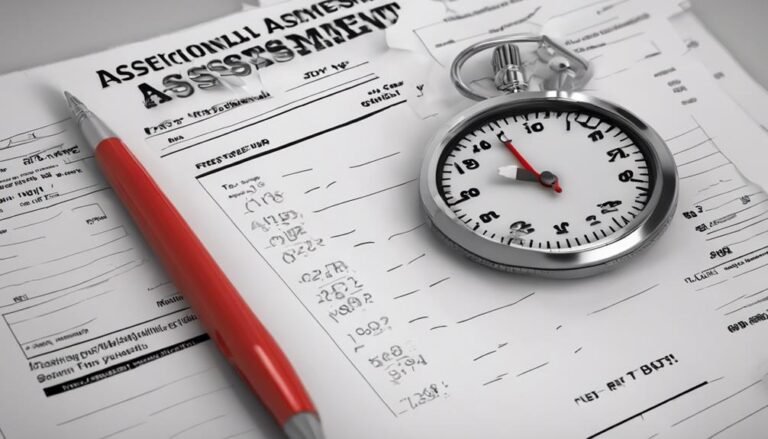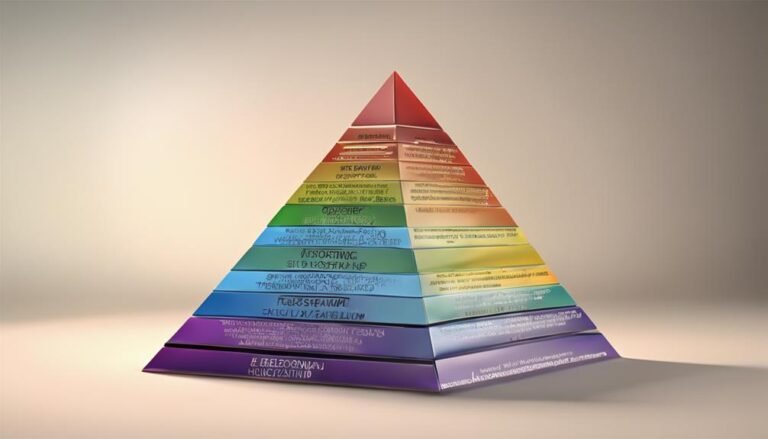Behavioral Assessments in Personality Psychology
Have you ever wondered how accurate behavioral assessments truly are in predicting personality traits and tendencies? The intricate relationship between observable behaviors and underlying personality constructs continues to intrigue researchers in the field. As you explore the nuances of behavioral assessments in personality psychology, you will uncover the nuanced methods used to decode human behavior and the implications for understanding individual differences. Stay tuned to unravel the complexities and significance of behavioral assessments in shaping our understanding of human personality.
Key Takeaways
- Behavioral assessments offer insights into observable behaviors in personality psychology.
- Validity and reliability measures ensure accuracy and consistency in assessments.
- Self-report and observational data are common assessment methods.
- Data analysis methods like regression and factor analysis aid in understanding behavior complexities.
- Assessments in clinical settings guide treatment planning and outcome evaluation.
Importance of Behavioral Assessments
Behavioral assessments play a pivotal role in providing objective insights into an individual's observable behaviors, allowing researchers to analyze and understand patterns that contribute to the field of personality psychology.
Validity measures and reliability assessment are essential components of behavioral assessments. Validity measures guarantee that the assessment tool is accurately measuring what it intends to measure, providing researchers with confidence in the results obtained.
Reliability assessment, on the other hand, confirms that the assessment tool yields consistent results over time, enhancing the credibility of the findings.
Behavioral observation is a fundamental aspect of behavioral assessments. By directly observing an individual's behaviors in various situations, researchers can gather valuable data that reflect their true characteristics and tendencies.
This observational approach provides researchers with rich insights into how individuals interact with their environment and others, shedding light on underlying traits and patterns that may not be evident through self-report measures alone.
Trait evaluation, facilitated by behavioral assessments, allows researchers to identify and categorize specific behavioral patterns, contributing to a deeper understanding of personality dynamics.
Types of Behavioral Measures
In the field of personality psychology, various measures are utilized to capture and evaluate observable behaviors, providing researchers with valuable insights into individual traits and tendencies.
Two primary types of behavioral measures commonly used are self-report and observational data. Self-report measures involve individuals responding to questions about their own behavior, thoughts, and feelings. These can include questionnaires, surveys, or interviews where individuals provide information about themselves. While self-report measures are valuable for understanding subjective experiences, they may be influenced by biases or inaccuracies in reporting.
On the other hand, observational data involves directly watching and recording an individual's behaviors in different situations. This type of measure offers more in-depth insights into how individuals actually behave, rather than relying on self-perceptions. Observational data can be gathered through naturalistic observations in real-world settings or controlled observations in laboratory environments.
Utilizing Behavioral Data Analysis
Effective utilization of behavioral data analysis techniques is essential in extracting meaningful insights from the collected data in personality psychology research. Data interpretation plays a pivotal role in understanding the complexities of human behavior. Statistical analysis methods such as regression, factor analysis, and cluster analysis are commonly employed to identify patterns and relationships within behavioral data.
By applying these statistical techniques, researchers can uncover underlying structures that may not be apparent through simple observation.
Engaging in thorough data interpretation allows researchers to draw accurate conclusions and make informed decisions based on empirical evidence. Statistical analysis aids in quantifying the impact of different variables on behavior, providing a more in-depth understanding of personality traits and behaviors.
Through rigorous analysis of behavioral data, researchers can validate hypotheses, identify trends, and contribute to the advancement of personality psychology knowledge.
Applications in Clinical Settings
Utilizing behavioral assessments in clinical settings offers valuable insights into understanding and addressing personality-related issues. In these settings, behavioral data analysis plays an essential role in treatment planning and outcome evaluation. By incorporating behavioral assessments into the therapeutic process, clinicians can tailor interventions to suit the specific needs of each patient effectively.
These assessments provide objective information that can guide the selection of appropriate therapeutic interventions, ensuring that the treatment aligns with the individual's personality traits and behaviors.
Moreover, behavioral assessments are instrumental in tracking patient progress over time. By regularly evaluating and analyzing behavioral data, clinicians can monitor the effectiveness of interventions and make adjustments as needed.
This continuous tracking of patient progress allows for a more dynamic and responsive approach to treatment, enhancing the likelihood of positive outcomes.
Considerations for Ethical Use
When utilizing behavioral assessments in personality psychology, it's important to adhere to ethical guidelines to safeguard the well-being and rights of individuals. Being aware of potential biases that may influence the assessment process is essential for maintaining objectivity and accuracy.
Additionally, obtaining informed consent and safeguarding confidentiality are key aspects in upholding ethical standards in psychological research.
Ethical Guidelines Importance
Considering the ethical guidelines is paramount when conducting behavioral assessments in personality psychology to safeguard the integrity and well-being of the individuals involved. Adhering to ethical considerations and professional standards guarantees that assessments are conducted in a fair, respectful, and responsible manner. Ethical guidelines serve as a compass, guiding psychologists to uphold the rights and dignity of participants, maintain confidentiality, and minimize potential harm.
Professional standards in personality psychology emphasize the importance of obtaining informed consent from participants, ensuring that they're fully aware of the nature and purpose of the assessment. This transparency fosters trust between the psychologist and the individual being assessed, contributing to the overall validity and reliability of the results obtained.
Additionally, ethical guidelines underscore the necessity of maintaining objectivity and avoiding biases that could compromise the accuracy of the assessment outcomes.
Potential Biases Awareness
Awareness of potential biases is essential in ensuring the ethical use of behavioral assessments in personality psychology. Bias recognition is vital as biases can impact the validity and reliability of assessment results, leading to inaccurate conclusions about an individual's personality traits. Researchers and practitioners must be vigilant in identifying and addressing biases that may stem from factors such as cultural norms, socioeconomic status, or personal beliefs.
Failure to acknowledge and mitigate biases can have significant ethical implications, potentially resulting in unfair treatment or misrepresentation of individuals. By actively recognizing and addressing biases, professionals in personality psychology can uphold the principles of fairness, respect, and integrity in their assessments. It's imperative to engage in ongoing training and self-reflection to enhance awareness of biases and improve the ethical use of behavioral assessments.
Understanding the influence of biases on assessment outcomes is a critical aspect of ethical practice in personality psychology. By prioritizing bias recognition and mitigation, practitioners can promote accurate and unbiased assessments that respect the diversity and individuality of each person.
Consent and Confidentiality
Ethical practice in utilizing behavioral assessments in personality psychology necessitates a keen focus on obtaining informed consent and maintaining strict confidentiality protocols.
Informed consent is essential as it ensures that individuals are fully aware of the purpose, procedures, and potential risks involved in the assessment process. Prior to conducting any assessments, it's imperative to obtain explicit permission from participants, emphasizing their right to withdraw at any point without repercussions. This foundational ethical principle not only upholds the autonomy and dignity of individuals but also fosters trust in the research process.
Privacy protection is another critical aspect of ethical practice when utilizing behavioral assessments. Researchers must implement robust confidentiality protocols to safeguard the sensitive information gathered during assessments. This includes secure data storage, limited access to results, and anonymizing data whenever possible to prevent the identification of individual participants.
Future Trends in Behavioral Assessment
As advancements in technology continue to reshape the field of personality psychology, the future of behavioral assessment appears to be moving towards more sophisticated and nuanced methodologies. Technological advancements have paved the way for predictive analytics to play a significant role in shaping how behavioral assessments are conducted. Machine learning algorithms are increasingly being used to analyze behavioral data, allowing for more accurate predictions and personalized feedback tailored to individual characteristics.
The integration of predictive analytics in behavioral assessment offers a glimpse into the potential future trends in the field. By leveraging large datasets and advanced algorithms, researchers can gain deeper insights into human behavior and personality traits. This shift towards more data-driven approaches not only enhances the precision of assessments but also opens up new possibilities for understanding complex behaviors.
Moving forward, it's likely that behavioral assessments will continue to evolve, incorporating more sophisticated technology and analytical tools to provide a detailed picture of an individual's personality. Embracing these future trends in behavioral assessment can lead to more precise and personalized insights, ultimately advancing our understanding of human behavior in personality psychology.
Conclusion
As you navigate the intricate landscape of personality psychology, think of behavioral assessments as the compass guiding your journey.
Just as a skilled cartographer uses tools to map uncharted territories, researchers use behavioral data to uncover hidden patterns in human behavior.
By harnessing the power of this information, we can navigate the complexities of personality with precision and clarity, ultimately leading to more effective interventions and a deeper understanding of the human psyche.







